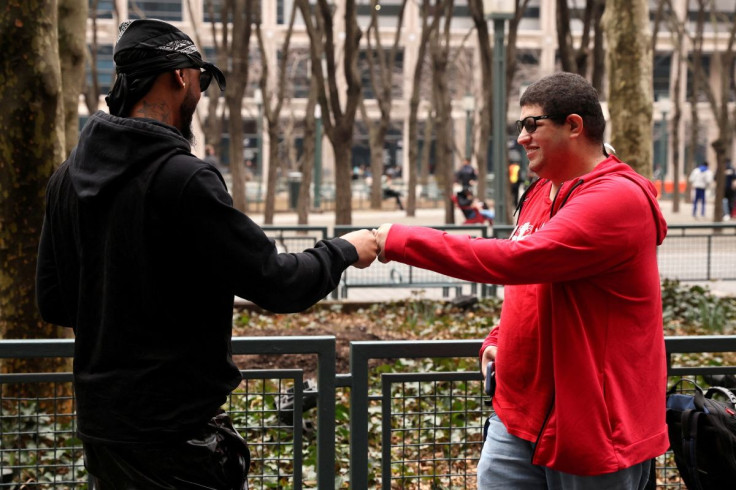Amazon Union Leader Smalls Went From Rapper To Unlikely Voice Of Protest

The road to organizing Amazon's first union in the United States was a long one for Christian Smalls.
The 33-year-old had worked at Walmart, Target and Home Depot. A rapper early in his career, he gave up music to support twin children, and by 2015, he took a warehouse job at Amazon in his home state of New Jersey, and later New York, he said.
It was not until the COVID-19 pandemic that Smalls found an unlikely calling: uniting workers at a company that for decades had resisted unionizing, and re-writing a labor playbook in the process.
In March 2020, the virus's spread had alarmed workers at JFK8, the retailer's Staten Island warehouse, who believed Amazon was not addressing the threat. Smalls decided to help stage a walkout demanding health safeguards including the worksite's closure. He showed up despite being on paid quarantine from a close COVID contact, so Amazon fired him -- catapulting him to fame.
New York's attorney general that day started looking into his firing, precipitating months of legal battles between the state and the retailer.
In leaked notes for which he voiced regret later, David Zapolsky, Amazon's general counsel, called Smalls "not smart, or articulate" and suggested the company "make him the face of the entire union/organizing movement."
And that's what happened.
The general counsel's attack was motivation to fight harder, Smalls said in an interview on Thursday. On Friday he pulled off an unthinkable victory as workers at JFK8 voted to unionize.
"It's the way we organized," he said, "the way I spent every single day talking to workers, rain or shine."
After his firing, he crisscrossed the country trying to rally essential workers, calling for an Amazon Prime Day boycott, even building a tree of defaced Amazon boxes outside founder Jeff Bezos's home around Christmas. People who said they were Smalls' associates alleged he did not properly account for the money he fundraised. Smalls disputed the claim and said he did not know the accusers.
He drew consternation from union officials, his likeliest allies, by saying his was the worker-led effort, free of older groups' baggage. Smalls said Thursday that he had no ill will toward traditional unions.
Many doubted Smalls when he announced plans to unionize JFK8 last year, but he set up a tent outside the warehouse, while supporters in the building touted how a union could demand higher wages, safer conditions and job security. His team raised money on GoFundMe. And over months, he dropped off food at JFK8 so the fledgling group, known as the Amazon Labor Union (ALU), could share literature over break-room meals.
He even got arrested. Amazon said he was repeatedly trespassing despite warnings, while Smalls framed the affair as Amazon's attempt to intimidate workers. Police made their own call on how to respond, Amazon said.
The ALU showed it was time to toss the manual on how to organize, said John Logan, a labor professor at San Francisco State University. While the group had to withdraw and later re-file its petition for a vote to make sure it had signatures from 30% of staff, Smalls had the right instincts.
"They filed with just over 30%, no experienced organizers or lawyers, ran a campaign that many called chaotic and unprofessional, but they had great media and social media," Logan said. "Almost everything they have done goes against 'conventional organizer' wisdom."
Having finally won plaudits from organized labor, Smalls is now aiming to bring a union to a second Amazon warehouse in Staten Island, in a vote this month he said "will be a breeze" by comparison. He also has a harder goal for JFK8 in mind.
"We're going to try to deliver a contract. That's the number one priority," he said. "The real fight is the contract; that's what we're going to focus on next."
© Copyright Thomson Reuters 2024. All rights reserved.





















